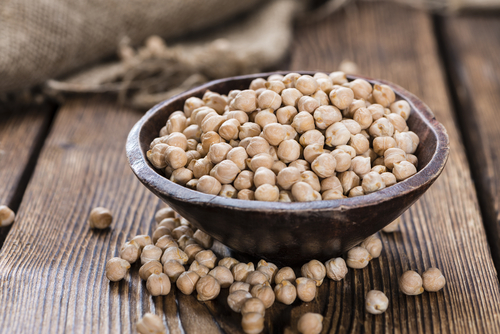Short answer
Chickpeas are very good for you. The nutrient-dense legume can help you control your weight, improve heart health and more. Chickpeas are, however, known to cause serious gas - beware!
Recommended Alternative
Long answer
Contrary to the name, chickpeas are not peas at all. Rather, they are members of the legume family. Also known as garbanzo beans, chickpeas are the earliest legumes to be cultivated—with remnants of such dating back to 7,500 years ago in the Middle East.
Chickpeas incredibly nutrient-dense, providing 20 percent or more of the daily recommended value for protein, fiber, folate and other dietary minerals. The super-legume also offers a significant amount of thiamin, vitamin B6, magnesium, and zinc.
What’s all that mean?
Eating chickpeas can help you lose weight or, at the very least, keep the number on the scale in check. Since legumes like chickpeas are chock-full of both protein and fiber, they enable you to feel fuller longer and on fewer calories. It also helps control your body's urge to pump insulin. Typically, insulin is released when your blood sugar spikes after a meal. This is detrimental to weight loss as insulin is a fat-storing hormone which may play a role in the onset of central obesity, also known as belly fat.
Chickpeas are also good for your heart. Numerous studies have also suggested that fiber helps lower LDL cholesterol levels, thus decreasing the risk of heart disease. Folate, another abundant nutrient found in chickpeas, has been linked to the control of high homocysteine levels—a well-known risk factor for heart disease. Finally, magnesium is another super-nutrient found in chickpeas. It helps support proper blood pressure levels and fight the onset of hypertension.
Chickpeas may even help reduce your risk of certain types of cancer. When your stomach bacteria begins to break down and ferment chickpea fiber, the reaction produces a metabolite called butyrate. A short-chain fatty acid, butyrate has been shown to promote the destruction of cancer-causing cells. Plus, beta-sitosterol, chickpea’s primary plant compound, has been linked to a reduction in colon tumors in animal studies.
So why would anyone pass on chickpeas? While chickpeas generally offer many dietary perks, there are a couple of side effects to eating them that you should be aware of. The high-fiber content can cause stomach issues: bloating, gas, cramps, and diarrhea are all possible.
Our advice? Don’t skip out on chickpeas: a little gas is a small price to pay for the many health benefits this legume offers. If the flatulence is a concern for you, simply scale back your serving sizes or indulge less frequently. And if you have pre-existing digestion issues or a sensitive stomach, speak with your physician before adding chickpeas to your regular diet as the side effects may be more severe with these conditions.
Possible short-term side effects
- bloating
- gas
- abdominal cramps
- diarrhea

Benefits
- promotes weight loss
- decreases risk of heart disease
- decreases risk of hypertension
- protects against certain types of cancer
Our Wellness Pick (what is this?)
Eden Organic Garbanzo Beans
- U.S. Grown
- No Salt Added
- Non-GMO & Gluten-Free
- Vegan & Kosher
- Ready to Serve
 Approved by
Approved by 








.png)






